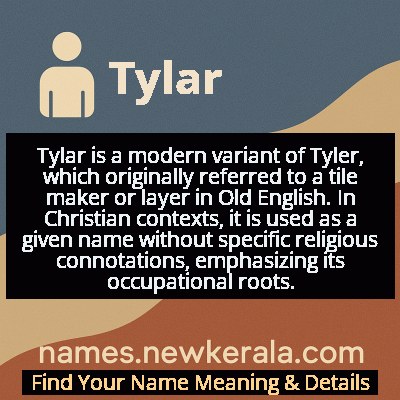Tylar Name Meaning & Details
Origin, Popularity, Numerology Analysis & Name Meaning of Tylar
Discover the origin, meaning, and cultural significance of the name TYLAR. Delve into its historical roots and explore the lasting impact it has had on communities and traditions.
Name
Tylar
Gender
Male
Origin
Christian
Lucky Number
4
Meaning of the Name - Tylar
Tylar is a modern variant of Tyler, which originally referred to a tile maker or layer in Old English. In Christian contexts, it is used as a given name without specific religious connotations, emphasizing its occupational roots.
Tylar - Complete Numerology Analysis
Your Numerology Number
Based on Pythagorean Numerology System
Ruling Planet
Uranus (Rahu)
Positive Nature
Strong sense of order, loyal, practical, and disciplined.
Negative Traits
Stubborn, overly serious, rigid, and prone to feeling restricted.
Lucky Colours
Blue, gray.
Lucky Days
Saturday.
Lucky Stones
Blue sapphire.
Harmony Numbers
1, 7, 8.
Best Suited Professions
Managers, engineers, accountants, organizers.
What People Like About You
Dependability, discipline, practicality.
Famous People Named Tylar
Tylar Reagan
American football player
Professional defensive end for Kansas State Wildcats with NFL aspirations
Tylar Young
Australian rules footballer
Key defender for Richmond Football Club in AFL
Tylar Witt
Musician and composer
Innovative electronic and classical fusion composer
Name Variations & International Equivalents
Click on blue names to explore their detailed meanings. Gray names with will be available soon.
Cultural & Historical Significance
As Christianity spread throughout Europe, many occupational names like Tyler/Tylar were adopted as given names, reflecting the Protestant work ethic and the value placed on honest labor. The modern spelling 'Tylar' emerged in the late 20th century as parents sought unique variations of traditional names while maintaining their historical connections to craftsmanship and industry. This evolution mirrors broader naming trends where occupational surnames transitioned into first names, celebrating the dignity of skilled labor and the importance of building and creating in society.
Extended Personality Analysis
Individuals named Tylar are often characterized by their strong work ethic, practical mindset, and attention to detail—traits that echo the name's occupational origins. They tend to be methodical problem-solvers who approach challenges with patience and precision, much like a master craftsman carefully laying each tile. Tylars typically exhibit reliability and consistency in their personal and professional relationships, making them trusted friends and colleagues.
Their industrious nature often manifests as ambition and determination, though they typically pursue their goals through steady, persistent effort rather than flashy displays. Many Tylars demonstrate excellent spatial awareness and creative problem-solving skills, potentially reflecting the mathematical and artistic aspects of their name's tile-making heritage. They often balance traditional values with modern adaptability, showing respect for established methods while being open to innovation when it serves practical purposes. This combination of reliability and flexibility makes Tylars valuable team members and leaders in various fields.
Modern Usage & Popularity
Tylar has experienced moderate but steady usage since the 1990s, particularly in English-speaking countries like the United States, Canada, and Australia. The name represents a contemporary spelling variation of the more traditional Tyler, appealing to parents seeking familiar-yet-unique names for their children. According to Social Security Administration data, Tylar has consistently ranked outside the top 1000 names in the US, maintaining its status as an uncommon but recognizable choice. The name's usage peaked in the early 2000s alongside similar creative spellings of traditional names. Modern Tylars are often found in diverse professional fields, though there's a noticeable concentration in hands-on careers like construction, engineering, design, and technology—fields that align with the name's 'maker' connotations. The name's gender-neutral quality has contributed to its enduring appeal, though it remains more commonly used for boys.
Symbolic & Spiritual Meanings
Symbolically, Tylar represents foundation, structure, and the building blocks of life—metaphors drawn directly from the tile-making profession. Just as tiles create protective roofs and beautiful floors, the name suggests someone who provides stability and creates order from chaos. The tile itself symbolizes interconnectedness and pattern-making, reflecting how individuals named Tylar often excel at seeing how different elements fit together to form a cohesive whole. The firing process in tile-making—transforming soft clay into durable ceramic—parallels personal growth through challenges and adversity. In a broader sense, Tylar embodies the artisan spirit: the transformation of raw materials into functional beauty through skill, patience, and vision. The name carries connotations of protection (as roofs shelter) and beauty (as decorative tiles enhance spaces), suggesting individuals who both safeguard what matters and add aesthetic value to their environments.

